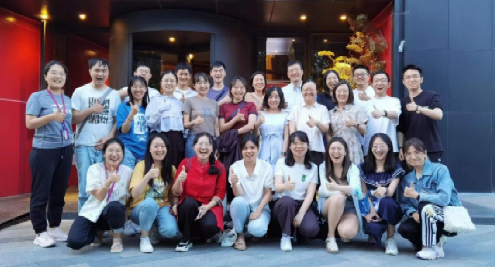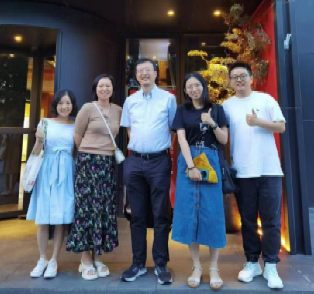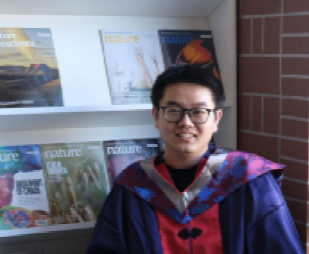Liu Yang is a Ph.D. graduate of the Department of Earth System Science (DESS) in Tsinghua University in 2023. He graduated from the School of Physics, Peking University with a bachelor's degree, and was recommended to study in the PhD Program in Ecology in the DESS, Tsinghua University in 2017. Liu Yang studied under Professor Zhang Qiang, and his main research interests are comprehensive evaluation modeling and collaborative management of climate and the environment. His paper published in Lancet Planetary Health was selected as a hot paper in The Lancet. He was also elected as "Shui Mu Scholar" in Tsinghua University.
Like most children, Liu Yang dreamed of becoming a "scientist" when he was a child, although he might not fully understand what a scientist was at that time. After his undergraduate study, Liu Yang firmly chose to go on with academic pursuit. Over five years of doctoral research have acquainted Liu Yang with not only the ups and downs of the academic road but also the magnificence of the research journey. Today, he still maintains his passion for research and keeps going forward.
"Define development goals as early as possible, fully share academic resources, and be good at collaborating with peers" is the message of He Kebin, President of the Institute for Carbon Neutrality, Tsinghua University and Academician of the Chinese Academy of Engineering, to graduate students at the opening ceremony of the year when Liu Yang was enrolled. Approaching graduation, while looking back on his growth path, Liu Yang noted that it was this key exhortation that had been inspiring his growth on the journey of scientific research.
Liu Yang actively sought his own research direction for a better future. The moment Professor Zhang Qiang, his supervisor, introduced the research plan of China's independent emission prediction and evaluation framework, Liu Yang determined his own research direction and goal. Over the past five years, Liu Yang has participated in the integration of the comprehensive evaluation model and the emission inventory model, established the scenario of independent emission prediction in China, and evaluated the future air quality and health benefits in China. "Prof. Zhang has a keen strategic vision," said Liu Yang, "It so happens that our research period coincides with the launch and implementation of the national carbon neutrality and carbon peaking strategy, so that our research results can support the national research plan in time and respond to major national policy needs."
A variety of academic exchange platforms offered by the university and the DESS has increased the opportunities for Liu Yang to communicate with experts and scholars in other fields, and broadened his academic horizons, which has also become an effective way for him to understand the latest viewpoints in the academic community most quickly and efficiently. The comprehensive evaluation model used by Liu Yang has been developed abroad for more than 30 years. To speed up the learning efficiency of the model and improve the understanding about the model, Prof. Zhang Qiang has actively supported Liu Yang to carry out international exchanges and cooperation. In 2018, Liu Yang studied for half a year as an exchange student at the Global Change Research Institute of the Pacific Northwest National Laboratory (PNNL) in the United States, where he deepened his understanding and mastery of the whole model through the exchange with many other researchers. During this period, Liu Yang participated in the construction of the Chinese version of the comprehensive evaluation model, joined the core model development team, made improvements for the industrial sector, and realized the fine prediction of the model industry, injecting new vitality into this model born in the 1980s.

Group photo of the Research Group
The mutual support of the members in the Research Group is one of the important reasons for Liu Yang's achievements. During his doctoral studies, whether for the difficulties in research and study or the troubles of campus life, Liu Yang could always receive help and support from professors and students of the Research Group at the critical time. “Every time I discuss with my supervisor, I will always receive many sobering or inspiring suggestions. What impressed me the most was that in a report, the supervisor comprehensively analyzed the background of the audience, the reporting environment and the reporting order, put forward detailed guidance on the logical relationship and the presentation of the results of the report I was about to deliver, and explained the reasons for the opinions one by one,” noted Liu Yang. In the following scientific research, the supervisor’s rigorous and meticulous work attitude always exerts a formative influence on him.

Group photo of graduates and supervisors
Liu Yang believes that research is never divorced from reality, as the ultimate goal of research is to address real problems. Liu Yang's Research Group has been involved in the national air pollution control all the year round. While obtaining rich research results, the group also draws on scientific and technological strength to support the formulation of national pollution control policies. Right after he was enrolled, Liu Yang participated in the compilation of the "2+26" city list, conducting many in-depth field investigations in enterprises and residents' homes to establish high-resolution emission inventory data in support of the national demands for pollution control. Liu Yang has a proud sense of achievement seeing that the emission list he participated in has been applied in pollution control, and all kinds of policies supporting air pollution control have been launched and implemented. In his view, the most honorable thing is to be able to participate in the national pollution control work, and to see the research results can contribute to the national development and improve the environmental quality.

Liu Yang’s graduation photo
Upon graduation, what Liu Yang wants to express most is thanks. Thanks to the university for providing such a wonderful campus life; Thanks to the Department of Earth System Science, where he has met some many mentors and friends; Thanks to the supervisor, who has led him to overcome difficulties on the academic road; Thanks to himself for not setting limits for himself so that he can enjoy different life views; And thanks to the era for setting up such a broad stage and offering such a bright prospect. May you all work hard in your respective pursuit and we are always together as we share the same vision for making the world a better place!